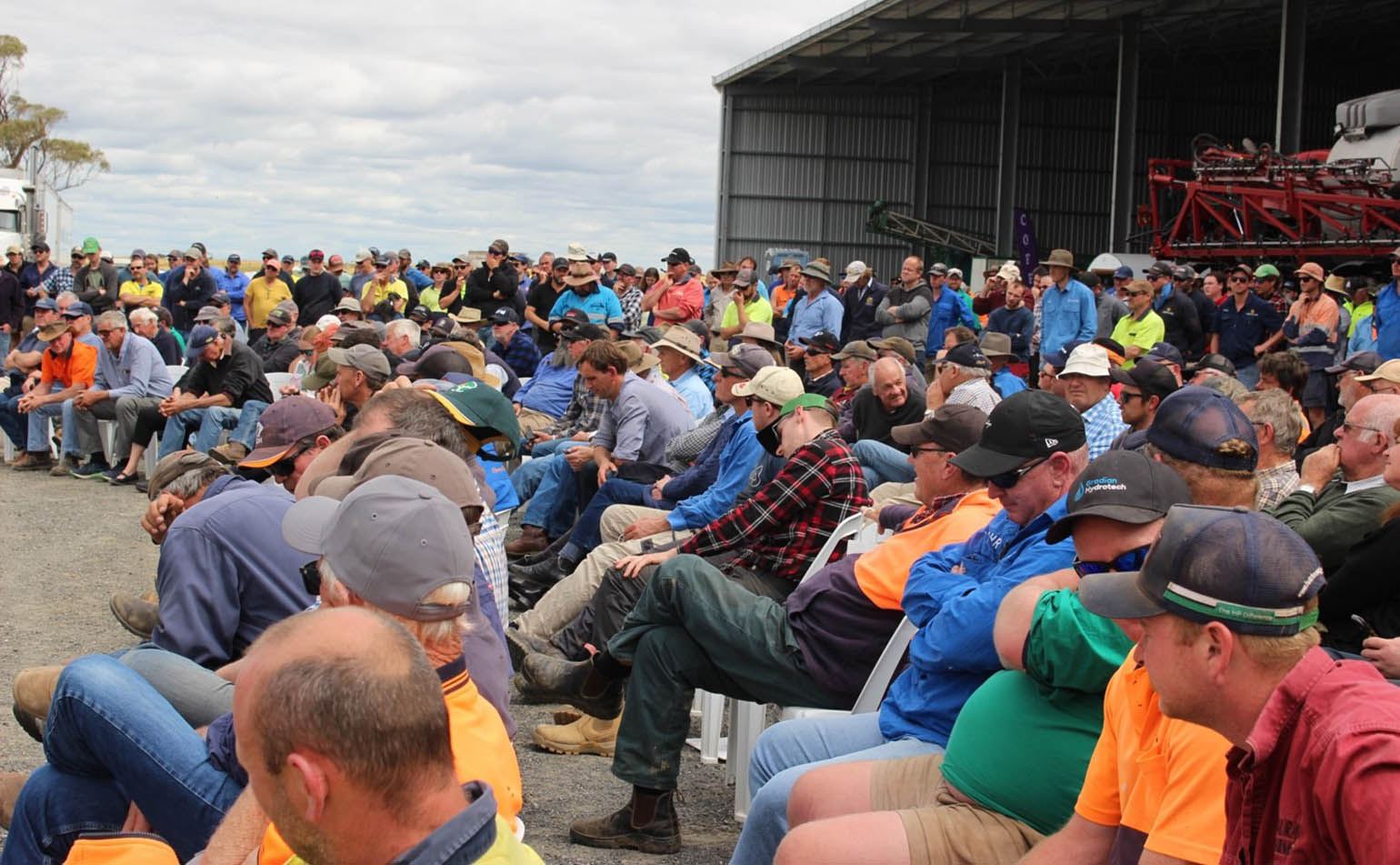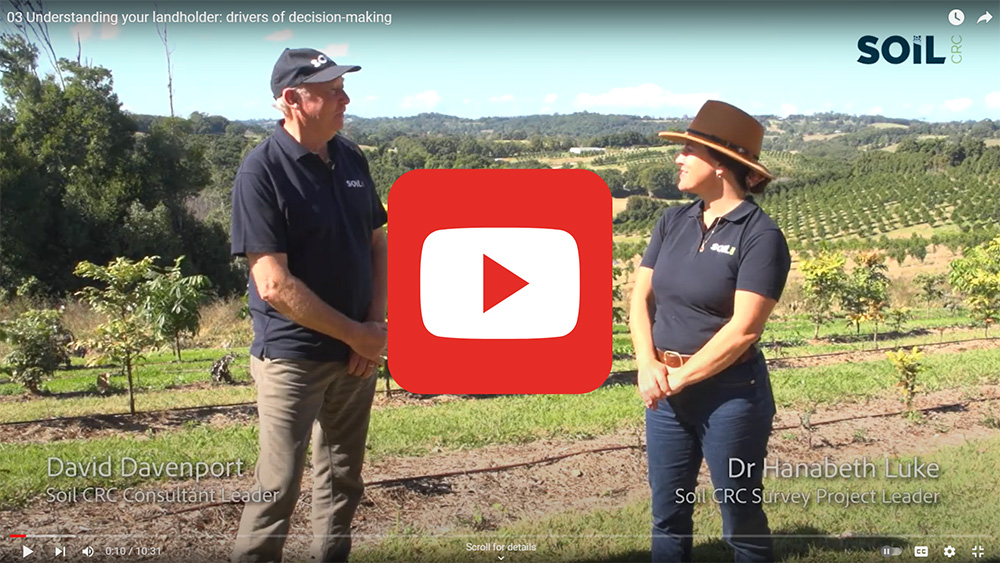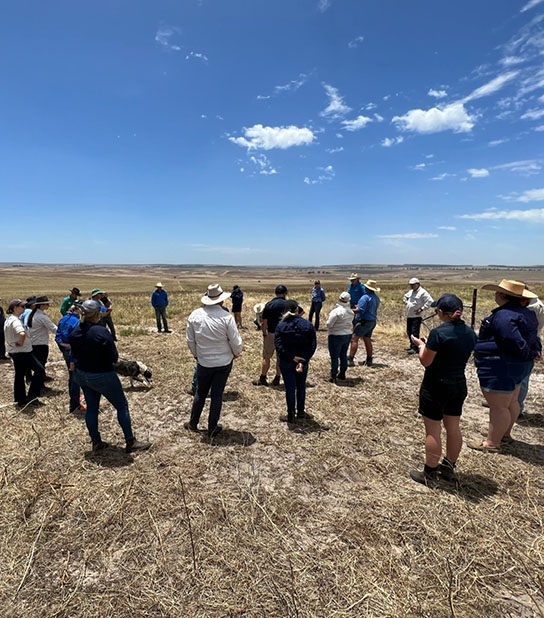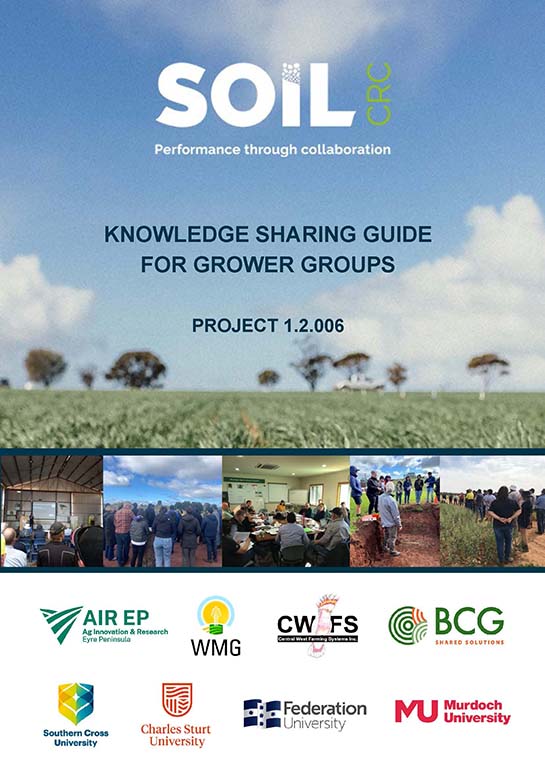Key points
- Face-to-face engagement remains the most effective method of knowledge sharing, despite the rise of digital communication.
- Effective knowledge sharing requires understanding farmer needs, engaging respectfully, focusing on quality interactions, and responding to stakeholder needs with evidence based solutions.
- Knowledge sharing plans help grower groups have a clear and actionable plan regarding who they want to engage, why and how.
- While federal and state government policies support better soil management, current top down, tech-based knowledge sharing isn’t proving effective. Clearer metrics are needed to assess what truly works.
The challenge
Effective knowledge sharing in agriculture is complex and multifaceted. Farmers often face barriers in accessing and implementing new knowledge, such as geographic isolation, time constraints, and the overwhelming amount of information that may not always be relevant to their situation.
Additionally, the diversity in farming systems means that one-size-fits-all approaches to knowledge sharing are often ineffective. Each region and community have unique attributes and challenges, such as varying demographics, localised issues and local trends in the uptake of innovations.
Engaging them effectively requires understanding their context, respecting their experiences, and offering knowledge sharing methods that fit their needs.
Our research
This two-year project aimed to:
- Identify and test knowledge sharing strategies to increase the number of landholders actively engaged in soil health improvement practices across four farming regions.
- Identify policies and regulations that enable or constrain knowledge sharing.
- Provide recommendations for training and engagement for others involved in extension.
- Create a Knowledge Sharing Guide for grower groups.
The project built on the findings of previous Soil CRC projects, ‘Why soil management practices are adopted’, ‘Surveying on-farm practices’ and ‘Building farmer innovation capability’.
The project centred on tailored knowledge sharing plans for four grower groups. Groups were located in the Eyre Peninsula of South Australia, the West Midlands of Western Australia, the Central West of New South Wales and North-Western Victoria. These knowledge sharing plans were co-developed by researchers and the grower groups. They considered which strategies and approaches were most effective for engaging different target groups in each region, including underrepresented groups such as women and youth.
The knowledge sharing plans were delivered by the relevant grower groups and trialled over a two-year period. The plans used a combination of digital, print and face-to-face engagement strategies. Several regions trialled hands-off approaches to engagement, focussing on promoting and supporting farmer-led engagement through a ‘sticky beak’ type of field event.
The grower groups maintained process diaries, documenting their observations and experiences about what was working and what was not. These were discussed at regular project meetings so the grower groups could learn from each other’s triumphs and challenges, fostering a community of practice.
Ongoing discussions about the different engagement approaches helped identify what strategies and activities were best suited to their local context and farmers.
The research also explored the use and effectiveness of digital engagement tools, such as social media, podcasts and e-newsletters. Interviews and analysis of the process diaries were used to assess their effectiveness.
Federal and state-level policies and regulations that either enable or constrain knowledge sharing were thoroughly reviewed and analysed.
Research findings
Grower group knowledge sharing plans
Each grower group had different engagement strategies.
Agricultural Innovation & Research Eyre Peninsula (South Australia) prioritised engaging younger farmers and promoting a holistic approach to soil and landscape health. On the Eyre Peninsula, person-to-person engagement strategies will likely remain paramount moving forward, but increasing the use of social media, particularly podcasts, can help to engage younger farmers. During the course of the project, the group started two new engagement projects supporting younger farmers.
West Midlands Group (Western Australia) trialled new digital engagement methods like podcasts and e-webinars, alongside taking a step back from leading events, rather supporting farmers to lead their own events on their farms.
Central West Farming Systems (NSW) focused on increasing engagement among women, achieving notable success despite challenging circumstances (Covid-19 and restrictions; a mouse plague; a catastrophic flood and a season with no sunshine). They are finding that their engagement is notably increasing, with 150 women attending the Rural and Regional Women and Youth Conference in November 2023.
Birchip Cropping Group (Victoria) worked on broadening their audience, particularly engaging more women and younger farmers, with innovative event formats. Their ‘bog day’, or ‘safely recovering machinery day’, had over 600 attendees and featured local, well-known farmers, reinforcing the importance of local champions in knowledge sharing.
In their final reflection interviews, the Executive Officers from each grower group noted that they found the knowledge sharing plans effective and expressed confidence that their teams would continue to use them. They believe the project has significantly enhanced their knowledge sharing efforts, particularly through the process of critical reflection and ongoing conversations within the grower groups.

An example of effective face-to-face engagement – nearly 600 people attending a Birchip Cropping Group event (Photo source: Kelly Angel, Birchip Cropping Group).
Fact-to-face is essential
Across all regions, the project found that while digital tools are useful, face-to-face engagement remains critical. Farmers prefer practical, hands-on learning opportunities such as field days, where they can directly observe and discuss farming practices with peers. Farmer-led events, supported, promoted and facilitated by the grower group work well. Farmer-led events can take many forms, such as farm walks/’sticky beak’ days, soil pits, shed presentations, discussions and workshops.
When sharing knowledge via experts, the exchange must be mutual, i.e. more than experts imparting knowledge and ideas – and it is important to give your experts clear guidance before they jump on stage. A grower group is an important intermediary in the farming system, and they may engage with farmers to deliver new practices or ideas. In turn, the grower group should be constantly learning from the farmers. This ensures the knowledge is adapted and presented to farmers in a way that suits their needs.
Peer-to-peer learning is an essential part of knowledge sharing, and offers farmers a range of benefits beyond new knowledge and ideas:
- Encouraging a collaborating group of farmers to work together towards a common goal can help build stronger relationships and impart a greater sense of achievement and well-being.
- These events also serve as vital social interactions in an industry that is often isolated.
- Learning collaboratively helps farmers build confidence in accessing, interpreting and making decisions based on data.
The project team created a series of knowledge sharing videos in which Soil CRC Knowledge Sharing Project Leader, Dr Hanabeth Luke, and soil consultant David Davenport, discuss some important points about working with and for farmers.

The knowledge sharing videos are available on the Soil CRC YouTube channel
Knowledge Sharing Guide for Grower Groups
The project developed a Knowledge Sharing Guide for Grower Groups. This Guide has been designed to walk grower groups through the development of their knowledge sharing plans. Some key knowledge sharing points from the Guide include:
Know your audience (build relationships with the farmers) and co-design projects. This comes with:
- Respectful engagement and authentic listening
- Developing an awareness and understanding of the issues, constraints, decision-making drivers, and local culture (e.g. demographics, attitudes, priorities)
Know your industry (the context in which your farmer is working and living)
- Timing of engagement is important, e.g. avoid seasonal constraints such as the middle of harvest time
- Do your research to understand the local and external factors and expectations that drive farmer decision-making
- Consider trusted sources of knowledge in the community, e.g. are there community champions or a popular podcaster?
Quality over quantity
- In a digital world, face-to-face engagement and boots on the ground is still the best way of sharing knowledge
- Intimate groups can be very successful
- Be explicit in pointing out your one (two at the most) strong take home message(s) that people can ponder and experiment with.
Be responsive and proactive
- For example, when an issue affects many of your stakeholders at the same time, such as flood impacts, you can use that as an opportunity to share relevant knowledge
- Back up your extension activities with the technical data, show them the evidence and demonstrate how to work with new technologies
- Provide food and drink.
Digital engagement
Grower groups are increasingly using digital engagement methods such as e-newsletters, podcasts, webinars, and social media platforms (X, Facebook, YouTube, Instagram) to connect with their audience. However, not everyone uses digital modes of communication and digital engagement needs to be part of a larger strategy to reach target audiences.
It is important to monitor the effectiveness of digital engagement tools to assess audience engagement and adapt strategies as needed. Grower groups experience different challenges with digital engagement methods, including variable audience engagement, insufficient allocation of time and resources to implement digital engagement tools (at the organisational level), and persistent connectivity issues in some locations.
Effective digital engagement requires a clear plan. The Digital Engagement Guide, developed as part of this research, presents a range of key considerations for grower groups when planning and implementing knowledge sharing via digital engagement. Some of the key considerations include:
- Developing a plan: who is your intended audience and how often will you communicate with them?
- What is the purpose and intended message of your proposed digital engagement tools?
- Delivery method: investigate the range of available digital engagement tools to understand the scope, reach, and value of each tool (and potential messaging reach) for your organisation and intended audience. Adopt one or two strategies to start with and build on these.
- Pilot your intended strategies with a small cohort of your target audience to get initial feedback about the method and content; consider using different digital engagement tools for different audiences.
- Monitoring and review. Platform analytics provide useful data about performance outputs and audience engagement.
- Expect challenges with your digital engagement tools. Identifying these ahead of time can assist in generating appropriate solutions that can be swiftly implemented.
Policy review
The policy review found that while State and Federal policies imply a desire to improve soil management outcomes, soil outcomes do not appear to have improved as much as expected. This is possibly due to a top-down approach to policy where the expectation is that knowledge generated by scientists will eventually filter down to farmers. Policy also seems to prioritise digital and technology-based knowledge sharing, but there are no metrics to support the extent to which this style of knowledge sharing is actually effective. The project recommends developing or implementing better metrics to assess the effectiveness of policy instruments.
Significance of findings
This research highlights the importance of building trust and understanding in knowledge sharing. Knowledge sharing experts need to be more than just information sources; they must build relationships, foster collaboration, and create social opportunities.
For farmers, who are inherently practical, seeing and doing remains a very effective way of learning new knowledge and gaining the confidence to trial new activities and strategies on their farm.
The findings also emphasise the value of a multidirectional learning process (i.e. sharing), where knowledge flows not just from experts to farmers, but also from farmer to farmer, and from farmers back to experts and policymakers. This approach helps ensure that policies and practices are grounded in real-world farming experiences.
Moving forward, the project revealed there are some higher-level strategic changes that could improve knowledge sharing.
Farmers need the confidence to know that new innovations will be worth their time and capital investment. To build this evidence base and encourage wider adoption of recommended best practices for land and soil management, innovators, researchers, and early adopters must receive continued support.
Finally, it is important to adopt a long-term, comprehensive approach to sharing knowledge in agriculture. Complex and transformative ideas require dedicated, sustained efforts and investment strategies that support extended timeframes and facilitate collaboration across different projects.
Next steps
At least three of the four grower groups plan to continue using the process diaries for ongoing event evaluation and staff training.
The process diaries will also be used in the new ‘Packaging Soil CRC tools to enhance extension and adoption of improved soil management practices’ project (1.2.008) led by the West Midlands Group. This project is focused on improving engagement in soil and land management, informed by the insights gained from this project.
The Knowledge Sharing Guide will become a component of the Soil CRC’s Adoption Plan and has been integrated into the Supporting Change in Regenerative Systems (ENVR6009) subject at Southern Cross University.


The Soil CRC’s Knowledge Sharing Guide for Grower Groups
Related projects
Related documents
Project videos
Project team
- Hanabeth Luke, Southern Cross University
- Naomi Scholz, Agricultural Innovation & Research Eyre Peninsula
- Kelly Angel, Birchip Cropping Group
- Diana Fear, Central West Farming Systems
- Nathan Craig, West Midlands Group
- Simon Kruger, West Midlands Group
- Alison Ollerenshaw, Federation University
- Sarina Kilham, Charles Sturt University
- Yvonne Haigh, Murdoch University
- Penny Cooke, Southern Cross University
Posted Nov 20, 2024

